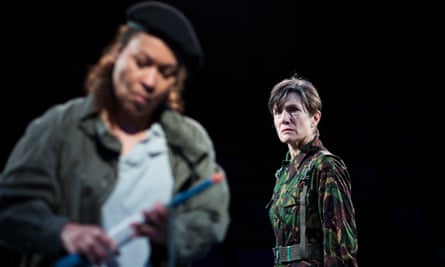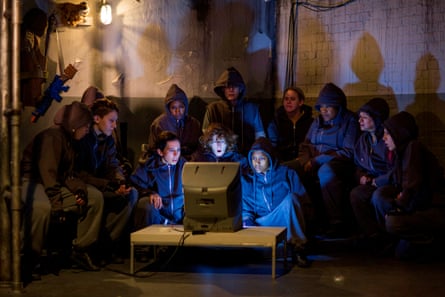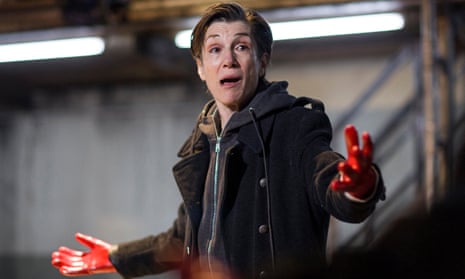“Quite a senior male director, who will remain nameless, went around calling it Julius Beaver,” remembers Josie Rourke, artistic director of London’s Donmar Warehouse, where Phyllida Lloyd’s all-female version of the Roman tragedy was staged in 2012. “People would just scoff at it. And scoffing did two things: it trivialised it, and it made it look experimental.” But for Rourke and her partner at the Donmar, executive producer Kate Pakenham, Julius Caesar was a serious statement of intent about addressing the lack of representation of women in theatre. It came to define their Donmar tenure which is about to end: Pakenham steps down this month and Rourke next year, when she will be succeeded by Michael Longhurst.
By 2016 the Donmar, a tiny but high-profile theatre in Covent Garden, had put on not one but three all-female Shakespeares, each with the great actor Harriet Walter, directed by Lloyd and with an ethnically diverse cast drawn partly from ex-offenders. The trilogy – which includes Henry IV and The Tempest – has already been staged back-to-back in a large tent in King’s Cross and travelled to New York. Now it is to be aired on the BBC.
Scepticism about what many considered to be a quixotic idea continued even after Caesar’s first triumphant run in London. According to Pakenham: “There were people close to us, who said to us, ‘Well, you’ve done that all-female thing now.’” As in – now’s the time to go back to the proper business of the theatre. Those people were, I infer, the Donmar’s board, though they are too discreet to be drawn. I sense that Rourke and Pakenham encountered opposition in their desire to shake up the Donmar which, under Rourke’s predecessor Michael Grandage, become famous for a particularly gilded, beautifully made and radiantly cast classic play – a model that became important to the theatre because of the way it operates financially. As Pakenham explains, very little of the Donmar’s income comes from Arts Council England, and only 35%, owing to its tiny size, from box-office receipts. The rest – 55% – comes from philanthropy. “The theatre got very good at fundraising in Michael’s tenure around star-driven, classic titles. The fear on us was that risk, or social mission, or inclusivity, could mean a disintegration of the value of exclusivity that was driving the business model.”

Rourke’s chosen direction was not to take the path of burnishing the “jewel” that is the Donmar but of “disrupting” the life of the theatre – both in terms of commissioning new writing and insisting on trying to open up its work beyond its traditional tiny well-heeled audience. Rourke has been committed to big, looming current affairs issues: there was James Graham’s play Privacy, which bounced off the Snowden leaks, Graham’s The Vote, looking at democracy to coincide with the 2015 election, and Steve Waters’s drama Limehouse, taking the long view of Labour by way of the birth of the Social Democratic party.
Pakenham thinks their stubbornness paid off. “The Shakespeare trilogy has a feminist mission, a social mission, an inclusivity mission, an education mission. And that actually drove philanthropy and partnerships and funding that made the theatre richer in every way.” Rourke adds: “The board has been on a phenomenal journey to embrace the things we have wanted to do. It has had its undulations but I think we got there.”

Rourke says her only regret about the Shakespeare productions is that “the dazzling conceptual brilliance” of Lloyd’s direction got somewhat lost amid the focus on gender. “If it had been directed by Ivo Van Hove or another one of those big auteur directors I do think her work would have been understood more deeply and seriously,” she says. There is also the matter of Harriet Walter – undoubtedly one of the great actors of her generation, whose deep interpretations of Brutus, Henry IV and Prospero were theatrical events in themselves. It was the desire to preserve these great performances, in the end, that persuaded Lloyd to allow the plays to be filmed, something she had resisted at first, finding the “NT Live” model of capture, with fixed cameras, unsatisfactory.
In the end, with the producers John Wyver and David Gopsill, a new model was devised, which involved shooting the trilogy of plays, when they were being performed in day-long stints in 2016 in King’s Cross, on two consecutive Saturdays – one week with eight cameras on one side, the next with the cameras on the opposite side. The resulting footage was edited together over several months, together with material from GoPro cameras. It was “an absolute nightmare”, says Pakenham – if one of the actors had taken ill and been understudied between performances, the whole plan would have collapsed. In the coming months, however, the plays will arrive on the National Theatre’s schools platform, and there are also 48 short films made by the cast to illuminate various issues arising from the plays on the Donmar’s website.

Looking back on the world as they found it when they were young guns in their mid-30s, some things have changed. Issues of gender in theatre have become more visible, not least since, in 2012, director Elizabeth Freestone and a team of researchers at the Guardian drew attention to a serious gender gap in all roles in England’s largest subsidised theatres. The bastion of the theatre establishment, the Royal Shakespeare Company, will this year mount a summer season directed entirely by women, while its artistic director Gregory Doran will then direct a Troilus and Cressida cast 50-50 between men and women. It is hard not to feel that Lloyd’s trilogy has played its part in a small but perceptible shift of attitude.
As for the future: Pakenham can’t wait for her first summer off with her young children before making concrete plans. Rourke is preparing her Donmar production of Measure for Measure, which she predicts may “get me into tepid-to-hot water”. The idea is to play it in two versions in a single evening – first in a 17th-century setting and then in a modern one, but with the two central roles of Isabella (Hayley Atwell) and Angelo (Jack Lowden) flipped. She is also in the process of debating edits to her first feature film, Mary Queen of Scots.
But they do not, the pair say, have a clandestine strategy for world domination, so much as an urgent need for time to breathe. One senses that Pakenham, in particular, has become radicalised by her time at the Donmar. “I want to hear women’s voices and voices we don’t usually hear,” she grins. “I definitely have become braver … The good girl has been squashed. And the rebel has been born.”
- Julius Caesar is on BBC4 on 17 June. Henry IV and The Tempest will be available on iPlayer following the broadcast.
- This article was corrected on 13 June 2018; the plays will be available on the National Theatre’s schools platform, and the short films will be on the Donmar’s website – not the BBC as originally stated.









Comments (…)
Sign in or create your Guardian account to join the discussion